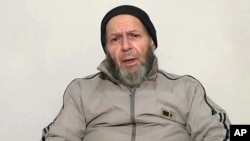The American aid worker who President Barack Obama said Thursday was killed accidentally in a U.S. anti-terror operation had been held by by al-Qaida since 2011 and had appealed to the administration to free him.
Warren Weinstein, 73, was kidnapped August 13, 2011 by unknown armed men in Lahore, Pakistan.
A resident of Rockville, Maryland, Weinstein was a business development expert working in Pakistan on a contract with the U.S. Agency for International Development. He had been in Pakistan for close to seven years when the gunmen stormed his residence and took him away.
Family statement
"The cowardly actions of those who took Warren captive and ultimately to the place and time of his death are not in keeping with Islam and they will have to face their God to answer for their actions," said Warren Weinstein's wife, Eliane, in a statement on behalf of the family.
"Warren spent his entire life working to benefit people across the globe and loved the work that he did to make people's lives better. In Pakistan, where he was working before he was abducted, he loved and respected the Pakistani people and their culture. He learned to speak Urdu and did everything he could to show his utmost and profound respect for the region," she said.
Possible explanation
A man who went through a similar ordeal while in custody of al-Qaida and Taliban militants in Waziristan narrated his ordeal, explaining how Warren Weinstein could have been hit in a U.S. drone strike on the Afghanistan-Pakistan border.
Professor Ajmal Khan, Vice chancellor at one of Peshawar’s universities, who spent four years as hostage of Islamic militants told VOA Deewa on Thursday, “Very rarely I missed the presence of drones in the area while in captivity. Drones were hovering over the region almost 24 hours."
"One night around 1.30 a.m. local time, the sound of a missile fired from drone woken me up and I felt that the outer wall of the house where I was staying has been hit," said Khan. "But in the morning I came to know that the house just across has been targeted where a number of foreign militants, mainly Turkmen and Uzbeks have been killed.”
He continued, "I believe that Warren Weinstein might have been killed because he was kept in the bases of the militants. I was treated differently because most of the time the captors kept me either in their houses with families or away from these bases, where Warren Weinstein might have remained with the militants all the time."
2014 comments
“I really don’t know why they are holding him. He was in Pakistan doing development work. He is just an old man, a sick man who was dedicated to doing his job in Pakistan and kept staying there for the benefit of the Pakistani people,” Elaine Weinstein told VOA’s Deewa Service in 2014.
Al-Qaida released a video in early May 2011 showing Weinstein telling President Obama that his captors would kill him if the U.S. leader does not meet the militant group's demands.
Monitoring groups said al-Qaida's media arm posted the nearly three-minute video of Weinstein on jihadist forums. In the video, Weinstein speaks impassively and tells his wife he is in good health.
Weinsten appealed to Obama again in late December 2013, asking him to help negotiate his release.
In a 13-minute video sent to several media outlets at that time, Weinstein looked gaunt and tired and said he is not in good health and feels "totally abandoned and forgotten."
Weinstein had a heart condition that required medication, along with high blood pressure and asthma. His family was worried that his health would fail or that he could be mistakenly killed by Pakistani forces.
The video, which showed no obvious signs of when it had been recorded, was created by al-Sahab, the media wing of al-Qaida. A handwritten letter that appeared to have been drafted by Weinstein and was dated Oct. 3, 2013 was distributed along with the video.
At the time, al-Qaida said it would release Weinstein if the U.S. halted airstrikes in Afghanistan, Pakistan, Somalia and Yemen. It also demanded the release of all al-Qaida and Taliban suspects around the world.
The White House called for Weinstein's release, but said it would not negotiate with al-Qaida.
Elaine Weinstein told VOA that her husband was in no position to make the U.S. change its policy.
“I think that there are some unresolved issues that [Weinstein’s captors] have and perhaps they think that by taking him, some of these issues can be resolved. He has no power to help them,” she said.
Elaine Weinstein said both the U.S. and Pakistani governments had assured her they were doing their best to secure her husband’s release.
“We have engaged several members of the Pakistani government and they tell us that they are trying to do everything in their power to get my husband released. And we have the same engagement with the United States government and they tell us that they are doing in their power to get him released,” she told VOA.
“He is a grandfather. I know Pakistanis respect their elders. Please have respect for my husband and send him home to his family where he belongs. And in case my husband gets to see this video, I want him to remember that we love him. We miss him terribly and we are trying everything in our power to get him home,” she said in 2014.
Kidnapper sentenced to death
Hafiz Imran, who was convicted of abducting Weinstein from his home in Lahore, was condemned to death on January 7, 2015 by a Pakistani anti-terrorist court.
Pakistan reinstated the death penalty in March, after militants attacked a school in Peshawar and killed 150 people, most of them children.
Some information from AP and Reuters was used in this report.









